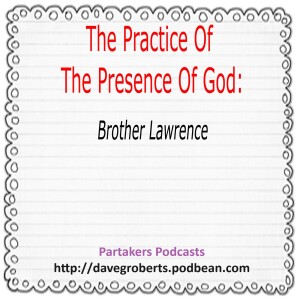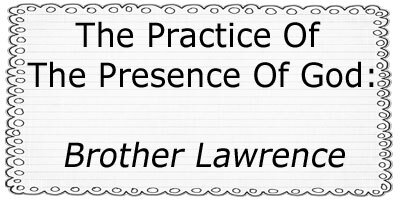
G’day and welcome to Partakers Christian Podcasts! Join us for uplifting Bible teaching, inspiring readings, heartfelt worship, powerful prayers, and fascinating church history. Whether you’re new to faith or growing deeper in your journey, we’re here to encourage and equip you. 🎧 Tune in, interact, and be inspired—wherever you are in the world.
Episodes

Sunday Jun 16, 2024
The Practice Of The Presence Of God - Brother Lawrence Part 3
Sunday Jun 16, 2024
Sunday Jun 16, 2024

The Practice Of The Presence Of God:
The Best Rule Of A Holy Life
G’day! Welcome to Partakers! Today we continue our Sunday series, where we are reading from a book by Brother Lawrence “The Practice of the Presence of God”… This book is available for you to freely download at various websites!
Outward business no detriment.
Perfect resignation the sure way.
That when sometimes he had not thought of GOD for a good while, he did not disquiet himself for it; but after having acknowledged his wretchedness to GOD, he returned to Him with so much the greater trust in Him, by how much he found himself more wretched to have forgot Him. (The downloadable audio continues the conversation...)
Right Mouse click or tap here to save this as an audio mp3 file

Saturday Jun 15, 2024
The Practice Of The Presence Of God - Brother Lawrence Part 2
Saturday Jun 15, 2024
Saturday Jun 15, 2024

The Practice Of The Presence Of God:
The Best Rule Of A Holy Life
G’day! Welcome to Partakers! Today we continue our Sunday series, where we are reading from a book by Brother Lawrence “The Practice of the Presence of God”… This book is available for you to freely download at various websites!
Love is to be the motive of all. Once in fear, now in joy. Diligence and love. Simplicity the key to Divine assistance. Business abroad as at home. Times of prayer and self-mortification not essential for the practice. All scruples brought to God. (The audio continues the conversation...)
Right Mouse click or tap here to save this as an audio mp3 file

Friday Jun 14, 2024
The Practice Of The Presence Of God - Brother Lawrence Part 1
Friday Jun 14, 2024
Friday Jun 14, 2024

The Practice Of The Presence Of God:
The Best Rule Of A Holy Life
G’day! Welcome to Partakers! Today we start a Sunday series, where we are reading from a book by Brother Lawrence “The Practice of the Presence of God”… This book is available for you to freely download at various websites!
Brother Lawrence was alive in the 1600s and this book of his details about how a person can benefit from the steady and soothing connection with God and to God. We have much to learn in the 21st century from this 17th century brother in Christ and that is what we hope each of us will gain from these conversations and letters recorded for us.
Brother Lawrence gives open advice and we will see his passion for spiritual concerns as he went about his work in the monastery - in the kitchens and as a cobbler. In these recordings, we see how he rejoices in the mundane duties, his persistent prayer life and was well known for his kindness, sympathy and willingness to help all others. So with that said, let us start with this fascinating book!
Conversations - First Conversation
- Conversion and precious employment.
- Satisfaction in God's presence.
- Faith our duty.
- Resignation the fruit of watchfulness.
The first time I saw Brother Lawrence was upon the 3rd of August, 1666. He told me that GOD had done him a singular favor, in his conversion at the age of eighteen. (The audio continues the conversation...)
Right Mouse click or tap here to save this as an audio mp3 file

Wednesday Apr 17, 2024
Bible Thought - Remember Who You Are
Wednesday Apr 17, 2024
Wednesday Apr 17, 2024
Colossians 3v1-4
“Remember Who You Are!”
During last week, I attended the funeral of a friend, mentor and editor. This friend is now more alive than ever before! Why? That is explained here from Colossians 3:1-4.
If then you were raised together with Christ, seek the things that are above, where Christ is, seated on the right hand of God. Set your mind on the things that are above, not on the things that are on the earth. For you died, and your life is hidden with Christ in God. When Christ, our life, is revealed, then you will also be revealed with him in glory. (Colossians 3:1-4)
Click or Tap here to listen to or save this as an audio mp3 file

Tuesday Apr 16, 2024
Testimony - Why I am a Christian
Tuesday Apr 16, 2024
Tuesday Apr 16, 2024

Why I am a Christian?
Right mouse click to save/download this testimony as a MP3 file
The Apostle John, writing in 1 John 5:9-12 - "We accept man's testimony, but God's testimony is greater because it is the testimony of God, which he has given about his Son. Anyone who believes in the Son of God has this testimony in his heart. Anyone who does not believe God has made him out to be a liar, because he has not believed the testimony God has given about his Son. And this is the testimony: God has given us eternal life, and this life is in his Son. He who has the Son has life; he who does not have the Son of God does not have life."
Why Is It So?
Why I am a Christian?
God had been pursuing me
In my more smug moments I used to congratulate myself for being a Christian. How proud I was that I, was a Christian and that God was a jolly lucky God that I had decided to follow Him. It was during one of my less self-deluded moments, that I examined myself and I found God pricking my conscience and correcting me, and I read the New Testament "For the Son of Man came, not to be served but to give His life as a ransom for many" (Mark10:45).
Right mouse click or tap here to save/download this testimony as a MP3 file

Thursday Feb 22, 2024
So Great A Salvation Part 12
Thursday Feb 22, 2024
Thursday Feb 22, 2024
So Great A Salvation
Part 12 - Overcoming Doubt
Confess
Confess your doubt as sin to God, and He will listen and cleanse you (1 John 1:9). If doubts persist, try talking to somebody whom you trust and confess to them your doubts, and they may well be able to help you (James 5:16).
Salvation
Have assurance of salvation. Be assured and let your mind be controlled by the Holy Spirit, so that you are not led astray. Your salvation rests on nothing apart from God’s promises and Jesus’ righteousness! Test yourself as Paul exhorts in 2 Corinthians 13:5.
Righteousness
Live a righteous life. Live the truth! When we started as Christian Disciples, before God we were given the righteousness of Jesus! But that righteousness needs to be lived out in the lives of Christian Disciples. Living right helps overcome any doubts!
Faith
Show total trust in God for your life. The faith we have is a defensive weapon against the mistruths, the doubts, that enter our minds. By maintaining our trust in God’s promises and God’s power, doubts are extinguished.
Bible
Read and study God’s Word so as to know, understand and live truth. Our lives are to be controlled by truth as revealed in Bible. When we know truth really well, we can recognize the lies that we are told! The Word of God, the Bible, is there to be studied diligently so that by trusting in the Holy Spirit to lead and reveal it to us, we get to know God and His promises! We are to grow in grace and in the knowledge of Jesus according to 2 Peter 3:18 and that is only achieved through studying the Bible! Then when we hear that nagging little voice that says “God didn’t say that”, we can say “Oh yes, He did!!”
Prayer
Talk to God. This is how we are energized! Fighting doubt in our own power is useless! Ask Him to help you overcome your doubts, and He will help you! When we talk to God, we strengthen our relationship with Him! When we ask other Christian Disciples to pray for us, Church unity is strengthened! When we see God answer prayer, our faith is matured and doubts are easily cast aside.
Click or Tap here to listen to or save this as an audio mp3 file

Wednesday Feb 21, 2024
So Great A Salvation Part 11
Wednesday Feb 21, 2024
Wednesday Feb 21, 2024
So Great A Salvation
Part 11 - When Doubt Sets In
It is a very rare person indeed who has not suffered some form of doubt, and asked questions similar to those of Jeremiah in the passage of Lamentations I read earlier. By doubt, I do not mean as in doubting God’s very existence, but rather doubting some aspect of the Christian life such as assurance of salvation, any of the other of God’s promises or doubting an attribute of God such as His innate sovereignty or His infinite goodness.
When doubt rises in you concerning God’s assured promise of salvation of you that usually occurs after engaging in wilful sin or having lost a spiritual battle. Doubting God’s sovereignty will usually occur after experiencing a great personal tragedy or of reading about an international disaster. When this occurs, it is important to have faith. Have faith in your knowledge of Scripture, and trust in its authority as God’s Word. When we sin, not only do we forget who we are as His children, but we also doubt what God has said is true in the Bible. The Christian Disciple learns to believe and trust God regardless of circumstances however divergent the experience is or was.
The originator of a lot of doubt in the life of a Christian Disciple is Satan, just as it was for Adam in the Garden of Eden (Genesis 3:1). Remember that Satan roams the earth like a devouring lion in order to stop Christian Disciples trusting in God and their testimony about God’s goodness (1 Peter 5:8).
Another source of doubt is the world we live in, with its own moral codes and perceived wisdom contrary to that of God expressed in the Bible. Whereas the Christian Disciple gains wisdom from God through having the indwelling Holy Spirit and reading the Bible, the world often has wisdom that is contrary. One only has to look at the perceived wisdom of atheistic scientific materialism countering the Christian arguments.
One final source of doubt, is the spiritual immaturity of the Christian Disciple. Doubting whether prayer works is often down to being double minded (James 1:8). Elsewhere Paul writes that doubt arises because of not knowing the basic doctrines of God (Ephesians 4:14). This source of doubt is only defeated through experience and having a maturing, disciplined life of obedience through prayer, studying the Bible and allowing the Holy Spirit to transform. In doing these things, the relationship between God and a Christian Disciple is nurtured and growing.
Next Podcast, we conclude this series, with the topic of overcoming doubt in the life of the Christian Disciple
Click or Tap here to listen to or save this as an audio mp3 file

Tuesday Feb 20, 2024
So Great A Salvation Part 10
Tuesday Feb 20, 2024
Tuesday Feb 20, 2024
So Great A Salvation
Part 10 - Dealing with Doubts
When you became a Christian, you started an exciting journey in the Christian life. Success in the Christian life is not an accident, but rather it is a direct result of living in harmony with the basic principles of life set forth in the Bible. The Christian life is not a matter of expecting spiritual maturity to occur overnight. The Bible lays down standards and principles of living which we need to follow with God’s strength, if we are to continue living at peace with God, our fellow men, and ourselves. We need to know what God expects of us and what guidelines He has given us to achieve this quality of life. As we apply the principles and guidelines of the Bible to our lives, we are transformed into the likeness of Christ – which is the journey we are on (Romans 8:28-29; 2 Corinthians 3:18).
Jesus said ‘I have come to bring them life in all its fullness’ (John 10:10). This is achieved as we allow Jesus Christ to live this life through us so that we start to think and respond like He does, to the people and circumstances around us. We need to learn how to see circumstances and people from God’s perspective, rather than reacting on the basis of feelings. When we respond to circumstances on the basis of our feelings that is when conflict, stress, tension and depression enter. When we respond to circumstances by looking from God’s perspective, it builds and shows a transformed character as we become more like Jesus.
Click or Tap here to listen to or save this as an audio mp3 file

Monday Feb 19, 2024
So Great A Salvation Part 9
Monday Feb 19, 2024
Monday Feb 19, 2024
So Great A Salvation
Part 9 - Godly Discipline
Christians are sometimes entangled by sin (Hebrews 12:1). God disciplines His children. “It is painful.” (Hebrews 12:11) Therefore if we are Christians, and we sin (remaining unrepentant and making a habit of it), God will discipline us because we are His children (Hebrews 12:10). If we sin and are not disciplined, we are not His children (Hebrews 12:8).
The Practice of Sin - Habitual Sin - The Christian cannot continue to sin habitually, willingly maintaining a sinful practice or attitude. That is why we are warned against doing so and thus falling away.
Note carefully the following two truths:
- We share in Christ if we hold firmly to the end. (Hebrews 3:13-14)
- It is possible to experience much of what God offers but fundamentally reject it and by so doing place ourselves outside and beyond the grace of God (Hebrews 6:4-6)
Living as a Christian Disciple is to be a life that brings glory to Jesus Christ. Part of that is a life of repentance, faith, perseverance and discipline. In doing these four things, the Christian Disciple inevitably carries their own cross daily, so that Jesus the Master is honoured and glorified.
Click or Tap here to listen to or save this as an audio mp3 file

Sunday Feb 18, 2024
So Great A Salvation Part 8
Sunday Feb 18, 2024
Sunday Feb 18, 2024
So Great A Salvation
Part 8 - Perseverance
Perseverance is the continuous operation of the Holy Spirit in the believer, by which the work of divine grace that is begun in the heart is continued and brought to completion. We read that:
- My sheep listen to my voice; I know them … and they shall never perish; no one will snatch them out of my hand… no one can snatch them out of my Father’s hand. They will never perish; no-one can snatch them out of my hand (John 10:27-29)
- “Very truly I tell you, whoever hears my word and believes him who sent me has eternal life and will not be judged but has crossed over from death to life (John 5:24)
- He who began a good work in you, will carry it on to completion until the day of Christ Jesus(Philippians 1:6)
- Shielded by God’s power. (1 Peter 1:5)
- Nothing can separate us from the love of God in Christ Jesus our Lord (Romans 8:38-39)
- The Lord knows those who are His (2 Timothy 2:19)
- That you may know that you have eternal life (1 John 5:12-13)
In summary then: eternal life never depends on our feeble grip on Christ, but rather on His firm grip on us.
Click or Tap here to listen to or save this as an audio mp3 file


